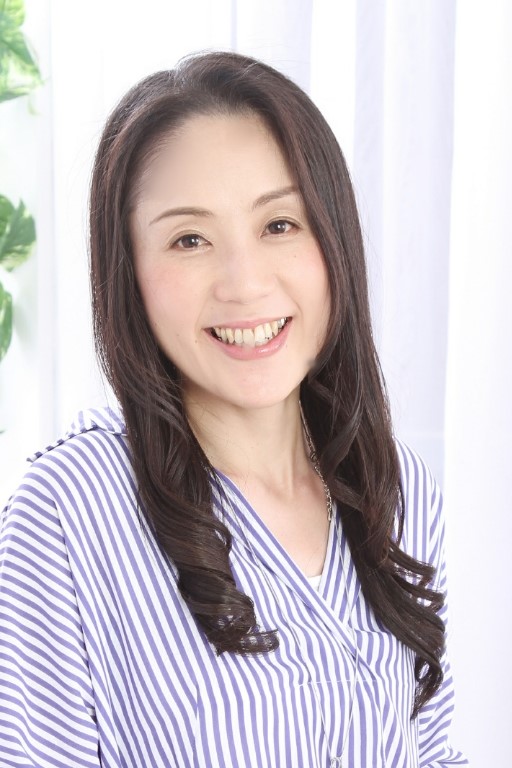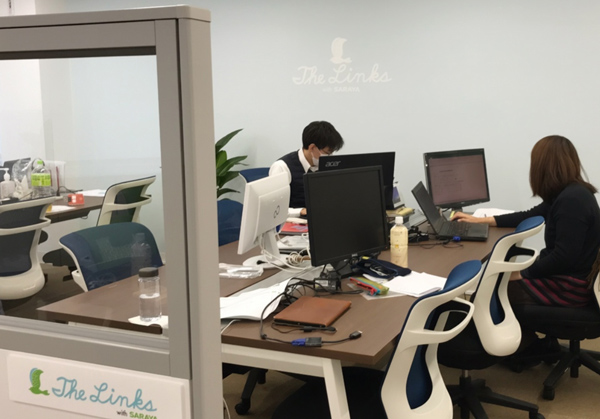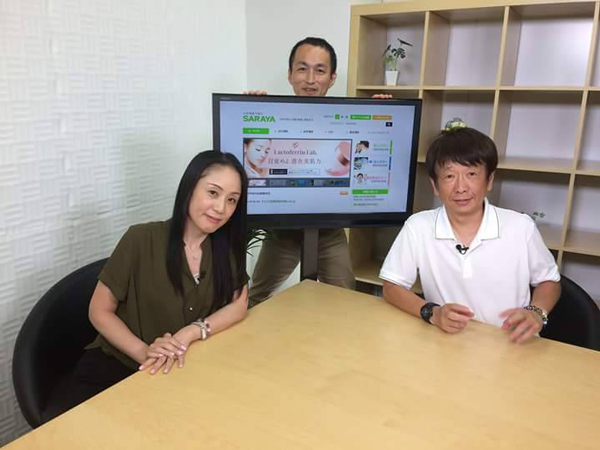SDGs Interviews: Talking Inequalities with Satomi Sasa

SARAYA is one of Japan’s leading companies that implement the United Nations Sustainable Development Goals (SDGs). This is the tenth chapter of SARAYA’s SDG interview series telling the story of those behind SARAYA and how they are working to achieve these goals. In this edition, we spotlight Satomi Sasa, Links, Co., Ltd. Director, a special subsidiary of Saraya, and discuss how companies can work with people with disabilities, tackling SDG number 10: Reduced Inequalities.
 |
|
How did you come to join SARAYA?
When I was a child, we always had Saraya's kitchen detergent "Yashinomi" in our kitchen, and I loved its stained glass-like design.
When I was looking for a job after graduating from university, the world was starting to pay attention to nature and the environment and Saraya caught my attention as a company that made Yashinomi, a kitchen detergent that was friendly to people and the earth.
During my time with Saraya, I found my husband, took maternity leave, had a baby, and now I have a very rewarding job working with people with disabilities. I am grateful to Saraya for providing me with this opportunity and for the many people who have helped me come this far.
Could you tell us about your background?
I was born and raised as an only child in Sakai City, Osaka Prefecture. When I was in junior high school, I often watched foreign films. I thought Brad Pitt and other actors in "Interview with the Vampire" were very cool. It was fascinating to see them speak in English. I decided to study English to be able to speak like them, so I went to a private girls' high school with an English department and majored in English Literature at a women’s university. I had a great experience staying with an English-speaking local family in Canada during my college years. As for hobbies, I like creative and cultural things. I enjoyed doing the tea ceremony and Ikebana, the traditional Japanese flower arrangement, in college.
During my four years as a university student, I worked part-time at a wedding hall every weekend. I was in charge of serving the food at the wedding reception, but what made me happiest was working as a lighting person. I enjoyed being able to shine the spotlight on the bride and groom, the main guests of the reception as they moved. It was very rewarding to help add more excitement to the party. During the Covid-19 pandemic, I have been cooking a lot of snacks and sweets for my family. The other day, I made a pizza from scratch, and my family loved it. I also did collage art.
On the music side, I like nostalgic melodies and songs, and I collect old records. However, some people say that I am faking my age. Recently, I have started playing the shamisen, a traditional Japanese three-stringed instrument.
I am blessed with a loving family of three: my husband, who is working in Saraya’s planning department, and my daughter who is a freshman in high school.
What is your role at SARAYA?
At Saraya, I am currently part of the Business Development Division. I am also the director of Links Co., Ltd., a special subsidiary of Saraya, and head of the Operations Department. There, I am in charge of general affairs for the entire office.
 |
| The Links logo. |
When I first joined Saraya, I was assigned to the Logistics Department. My job was to check for inventory discrepancies, and I worked until late every day. Later, I got married to someone I met at Saraya and went on maternity leave. After returning to work, I was assigned to the Mail Order Sales Department. That was 2005 when I began working with President Nagasawa of Links Co., Ltd., where I work currently.
I was transferred from the Mail Order Sales Department to the Sales Management Department, and then the Sales Management Department renamed later to the Business Development Division. There, I was assigned to work with people with disabilities, leading me to work with Links Co., Ltd.
How did you come to work with people with disabilities?
It was in 2014 that Saraya's sales management department was given the task of managing the huge list of customers in Saraya's database. This task required the involvement of people with disabilities. So we decided to hire a few people with disabilities in the sales management department, and I became their manager.
Since then, the number of people with disabilities we hired has increased along with the increase in the amount of customer list maintenance. As I interacted with them on a daily basis, I began to have a variety of thoughts. As I exchanged information and held study sessions with people outside the company who were involved in the employment of people with disabilities, I began to think more deeply about this issue and wanted to apply it to my actual work.
There are many things I have learned through hiring people with disabilities. In particular, I have learned that people with disabilities can be a solid asset to a company and realized that this will lead to increased productivity for the company, which in turn will lead to the SDGs.
How did Saraya come to employ people with disabilities?
At that time, the Japanese government imposed an employment rate for people with disabilities, which within Saraya had not yet been reached. Japan has a law called "Law for Employment Promotion of Persons with Disabilities," which currently requires employers to employ a number of persons with disabilities equivalent to their employment rate (2.3%). If this is not achieved, the company is legally required to pay a fine to the government. It was unfortunate that we were not able to achieve it then.
Initially, Saraya hired people with disabilities as a company, but as we worked together, and as we interacted with like-minded people outside the company, we realized that if we created a special subsidiary, we could take over the hiring of people with disabilities for the entire Saraya Group and create more suitable works in more suitable conditions.
When people with disabilities work in Saraya's various departments, they are subject to the company's work rules, which are not always the best for them, and they don't always work in a way that suits their situation. However, if a special subsidiary is established, new work rules can be created, working conditions can be taken into consideration, and special work environments can be created for people with disabilities, such as different working hours. In this way, I realized that people with disabilities could do work that suited them without strain. So, in 2005, together with my boss, Mr. Nagasawa (currently President of Links Co., Ltd.), I went to President Saraya to tell him our desire to create a special subsidiary. This led to the establishment of Links Co., Ltd., which I am currently in charge of.
Could you explain what your company, Links Co., Ltd. is about and what they do regarding SDG10, reduced inequalities?
 |
| Working at the "The Links" office. |
Links Co., Ltd. was established as a special-purpose subsidiary to expand the range of jobs available to people with disabilities, providing a place where many of them can work and shine while expanding their capabilities and improving their work skills. “Links” means “connections.” We connect people with disabilities to other people, companies, and many other things.
To achieve the goal, we have specialized rules and environments for people with disabilities and are constantly working to expand their understanding while becoming an asset to our company, and by using their activities as part of our corporate strategy, we will be able to create social value. On the other hand, we fulfill Saraya's employment rate for people with disabilities, which corresponds to SDGs 10 “Reduce Inequalities” as well as SDGs 17, "Partnership for Sustainable Development.” I believe our approach can lead to a better future for the world and the company.
Meanwhile, our current work includes consignment of various operations within the group, such as information processing service-related business, general affairs, and recruitment and employment support services for the disabled. Some specific tasks that can be managed by the disabled are sales support, customer data maintenance, business card maintenance, product data maintenance, programming, document creation, sample creation, lamination, CAD work, scanning, etc. Many of these tasks are also done working remotely, something we already encouraged before the Covid-19 pandemic.
What was a memorable project?
There are several, but one I will never forget is a project relating to depression.
A woman had been diagnosed with a mental disorder due to depression. This was the second time we had hired a person with disabilities, but she was having such a hard time that she could not take the train. However, she joined our sales management department, and as she worked, her health and performance improved, was promoted to associate employee, and even got married. After that, she was able to reduce her medication and even have a baby. She gained such confidence while working in SARAYA's former Sales Management Department, achieving her life goals.
Was there any hardship? and how did you deal with it?
As for myself, while I was managing the employment of people with various disabilities, I was sometimes not sure where to draw the line between their characteristics and their personalities and habits, and I had a hard time deciding whether it was something I should take into consideration or if it was just my selfish opinion. There were even times when I felt depressed in various situations, but a certain hearing-impaired woman always cheered me up. She was great support for me.
Also, my boss, President Nagasawa, who was the closest person to me and who understood me well, listened to me and encouraged me whenever I was in need. I was also encouraged by the sight of the people involved who were working hard on their duties and was able to connect with many people from other companies who are also managing the employment of people with disabilities. Through this process, I came to realize that I was not the only one having a hard time.
Regarding how to overcome hardship, we try to do many things to learn about disabilities and prepare beforehand. For instance, the job of data maintenance itself is not a problem for disabled people. However, they have health issues, and when they suddenly get ill, they have to take unexpected time off. In such cases, we have a work plan with a sub so that other people can cover the person's work. Even if I am absent, I have a sub, so I can be flexible. The situation is also always shared with the Links team members.
Before the Covid-19 pandemic, we had monthly study sessions, and sign language was part of the curriculum. We had people from other departments come and talk about their work. The program was designed so that the staff could feel what they were contributing. There was a hearing-impaired person and to communicate better with her, I taught myself sign language, learning a lot through this process.
We also have opportunities to talk about our disabilities. The term "disabled" is used to describe any person with disabilities, but each person has different disabilities that can be completely different from the rest. Even if you have a developmental disability, its effect depends on the environment, so we set aside time to introduce ourselves so that the staff could build good relationships with each other. Currently, we have stopped due to Covid-19, but everyone has been looking forward to the study sessions. There are many different kinds of people, but I think the most important thing is to try to understand each other.
When I see how hard everyone is working, it encourages me. I try not to do things that I would feel uncomfortable doing myself. For example, we lose motivation when we are warned in front of others, but people with disabilities get hurt more than normal people, so we need to be very careful when we speak.
When paying attention, first I think about what I can do to help. If the result is different from the instruction, I may point out the mistake if I were talking to an able-bodied person, but when working with people with disabilities, I need to stop and think about how and what I did before responding with firm words and compassion. If I still don't know what to do, I consult with a support organization. Thankfully, in Japan, some organizations support people with disabilities, and people with specialized qualifications are available for consultation.
 |
| On the left, Ms. Sasa. On the right, Mr. Nagasawa. Photo was taken during their video interview by https://shohgaisha.com/, a disability welfare informational media. |
Along the way, I have obtained qualifications. I am currently certified as a vocational life counselor for people with disabilities, a company-employed workplace adjustment aid, a vocational supporter for people with mental disabilities and developmental disabilities, and a Class II employment environment maintenance worker.
Working with people with disabilities has allowed me to grow as a person.
What is the future of Links Co., Ltd?
I would like to make the company more aware of Links' activities, helping us expand our job scope and promote the employment of people with disabilities. In addition, to promote the fact that we are a special subsidiary of SARAYA, I would like to explore opportunities outside the company talking about Links' activities, sharing ideas on what is necessary for the employment of people with disabilities.
Lastly, I would like to collaborate with people who are involved in the employment of people with disabilities at other companies and start a project together that will help solve community and social issues through the employment of people with disabilities.
Could you give us some words for the next generation?
I am glad to have been involved with Links, a company that has focused on working with people with disabilities, since its launch. This trajectory has allowed me to learn and grow as a person, to think for myself, to do things on my own, and to move forward.
If I could meet myself in my early 20s, I would tell myself that doing it yourself is the best way to contribute to society.
That is the message I want to pass on to the next generation.
Improving the sanitation, the environment, and health of the world.
Social

© Copyright Saraya.Co.Ltd 2024 All rights reserved.